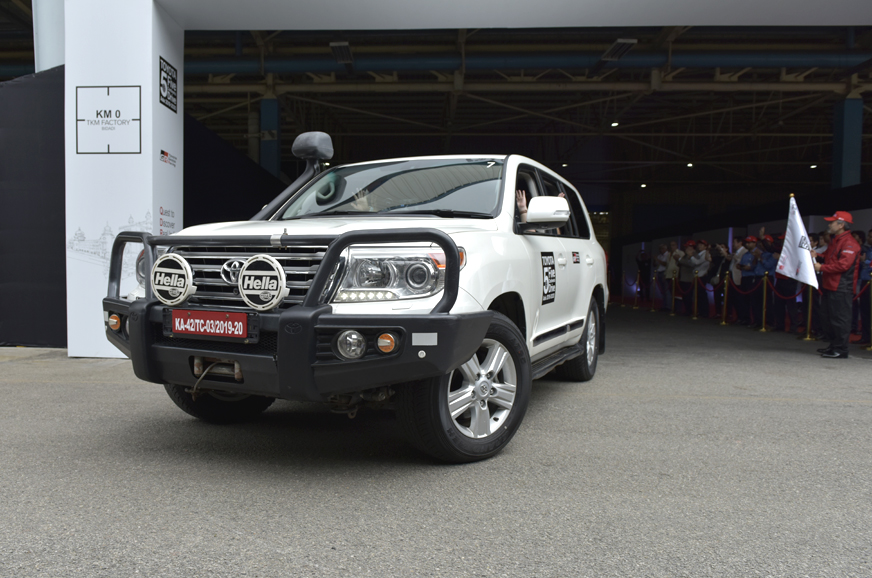
Driving in India is intense. The road surface changes every few kilometres, with the transitions between smooth roads, cratered lunar-like surfaces, single and dual carriageways, and state highways that resemble village roads coming abruptly. Adding to this is the ubiquitous chaos of animals, vehicles being driven on the wrong side, and most drivers deciding that the law applies to everyone except them. It was through this that the engineers from Toyota decided to execute the Indian leg of the Toyota 5 Continents Drive.
The Drive
Toyota’s drive to build the best cars is well known. Today, the carmaker sells some of the most trusted, reliable and high-quality vehicles in the world, and yet believes that its cars can be even better. Toyota knew that working on vehicles in workshops, simulations and test tracks wouldn’t be enough, and that its people needed to experience and study the cars in real-world conditions. Thus was born the idea of the 5 Continents Drive. Flagged off in 2014, the drive has made its way across every continent, and in 2019, it finally made its way to Asia. After a quick tour of the Middle East, the team from Toyota arrived to take on the streets of India.
Go and See
The main reason behind the drive was to understand what Toyota’s customers experience on the road and get to know their needs better. This made the Indian stage of the drive particularly crucial to the company. Not only is India an important market, but Indian customers are also some of the most quality-conscious, price-sensitive, and value-conscious in the world. Couple that with the demanding Indian road conditions and you get a testing ground like nowhere else in the world. India is where Toyota’s ‘Genchi Genbutsu’ philosophy (where employees go to the source to get the facts) paid dividends. To this end, an international team of 45 employees from Toyota Motor Corporation, Suzuki, Daihatsu and local affiliates set off on a 2,889km journey across India. Leading the convoy was the Land Cruiser 200, followed by the Innova Crysta, Innova Touring Sport, Fortuner, Camry HV, Glanza, Yaris, Land Cruiser, Corolla Altis, and the Suzuki Vitara Brezza.
Understanding India
In September 2019, a total of nine cars were flagged off from Toyota Kirloskar Motor’s plant at Bidadi near Bengaluru. Over the next 10 days, this convoy made its way through Karnataka, Maharashtra, Gujarat, Rajasthan and finally, New Delhi. India came as a bit of a shock to the Japanese, but they had processes in place and were prepared to deal with anything. Every time a car went past a reckless driver, a random object or an animal on the road, they radioed that information to the team. This was done even if the car following was a few meters away or hundreds of meters behind. The teams followed this process efficiently and reliably, irrespective of the number of times it was required of them. It’s probably this level of attention to detail that makes each Toyota car efficient, reliable and safe.
The teams had a few interesting takes on their experiences too. Yoshikazu Sahara of the Advanced Vehicle Engineering Development Division said, “The horns seem to have emotions. If you know the intention behind the sound, you get the strange sensation that you are listening to cars having a conversation.” After observing the conditions in several states, the team noted that, due to a shortage of electricity, wide acceptance of EVs may be difficult. They also saw that cars in India deal with drastic changes in road conditions and climate, and this was why Indians demanded greater reliability from vehicles than the Japanese. The team also made pertinent observations to improve the cars they offer in India, with points ranging from the angle of A-pillars to enhance visibility to a tighter turning radius to deal with our road conditions.
Our infamous speed breakers caused some concern too. While the SUVs and MPVs drove over them easily, the bigger bumps grazed the underbody of the hatchback and the sedans. Each car had four passengers and a fully loaded boot, so that may have been a contributing factor too. But the engineers didn’t take this as casually as we do. They spent some time on their hands and knees carefully examining the cars to make sure that there wasn’t any significant damage.
Driving across India helped the team learn the importance of getting local feedback too. They discovered the true nature of their customers and now want to create a system that collects local feedback and incorporates it into making cars better. Toyota’s Quest to Discover Real India — an iteration of the Quality, Durability and Reliability aspect of the brand’s philosophy — proved to be a worthy endeavour and one that promises to result in cars that will be even better than the Toyotas sold today.
Despite the challenging conditions, every Toyota, from the hatchback, the sedans to the SUVs, made it across the drive. Whether it was the narrow, tree-lined mountains of Coorg, the highway to Kolhapur, the incessant rainfall in the Western Ghats, or the harsh climate of Rajasthan, the cars performed beautifully. They proved over and over again that a Toyota badge means peace of mind. And now, Toyota is working to improve those very cars.
The intensity of India was matched by the efficiency of the Japanese. Shota Oshima from the External and Public Affairs Division, with firm resolve, said, “Some people may see the 5 Continents Drive Project as a type of tourism. But I can say that the Toyota cars that have experienced the 5 Continents Drive will become better cars”. There’s no doubt that Toyota’s methods work. And we’re looking forward to the new breed of cars that will emerge as a result of this drive.
Watch the below videos to know more:
Full Recap: https://www.youtube.com/watch?v=seyZtPVRk9E&t=3s
Customer First: https://www.youtube.com/watch?v=oRKXaK1RY0g
Made For India: https://www.youtube.com/watch?v=NDkatCNhkdo
Ever Better Cars: https://www.youtube.com/watch?v=IbmPere5o7k
from Autocar India - Cars https://ift.tt/2SJVs3O

0 comments:
Post a Comment